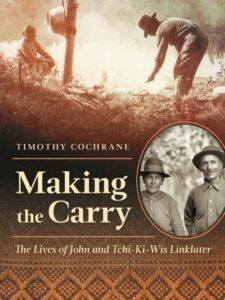Timothy Cochrane, author of Making the Carry: The Lives of John and Tchi-Ki-Wis Linklater
Emilie Buchwald Award for Minnesota Nonfiction Category, sponsored by Annette and John Whaley
Each week leading up to the 36th annual Minnesota Book Awards, we are featuring exclusive interviews with our finalists. You can also watch the authors in conversation with their fellow category finalists here.


What is one detail you wanted to include in this book, but couldn’t find a place for?
Writing a dual biography of people long since passed and indigenous means there was less “material” to use than for many contemporary and topical subjects. So, it’s the epic and seminal events that I wish I could have added to Making the Carry such as (1) John Linklater’s grandmother’s canoe journey with her five kids 500 plus miles to Red River after her husband drowned. Or (2) the circumstances of the Linklater’s older daughter’s (Margaret) death at 20 years of old and the role her White, logger husband played in it (did she die of neglect or murdered?). Or (3) it would have been great to portray a scene in which John and his sister Alice were speaking “Bungee” a now extinct language once spoken by Scottish-Cree Metis.
Tell us about someone who proved instrumental to the creation of this book.
Anna Wirta Kosobuski, great granddaughter of John and Tchi-Ki-Wis Linklater (and a number of other Linklater descendants) were incredibly generous and trusting with providing me family photographs, papers, and some pertinent oral histories (once collected by Warner Wirta). And beyond family members, the Maki family of Ely assisted me in locating rare documents and even showing me the old Linklater site on Jackfish Bay, Basswood Lake. Indeed, the Linklater’s many friendships from years ago has been passed down to their friends’ contemporary descendants who were also eager to help reconstruct and retell the Linklater family story.
Tell us about a favorite read from the past year. Why did you find it enjoyable, insightful, or memorable?
Two remarkable books about Metis people and which are great reads are: Joseph Kinsey Howard’s Strange Empire: Louis Riel and the Metis People and Maria Campbell’s Halfbreed. Both are passionately written books and while older have stood the test of time. Both are seminal books to understanding the contemporary explosion of Canadian research about Metis people and their legal recognition as an indigenous group under the Canadian Constitution. Metis do not have a similar status in the U.S.

Please tell us something about yourself that is not widely known.
Before coming back home to Minnesota, I worked in Alaska doing dispute resolution work between Alaska Natives and the National Park Service personnel. And there were lots of simmering and hot disputes, one in Glacier Bay almost coming to bloodshed. Another was at Katmai National Park…. Many of those videos of grizzly bears grabbing salmon jumping out of a stream are from Brooks Camp, Katmai on lands that were once an Alaska Native family allotment and the site of an ancient and one of the longest continuous settlements in North America.
Very different topic: most folks are unaware my academic training is as a folklorist.
Share your thoughts about the role and value of libraries.
Librarians and archivists make my work possible. Without them much of my research would be curtailed and clipped. Just the availability of interlibrary loan – especially if you work in outstate Minnesota – is incredible and freeing. I think of libraries as one of most democratic of institutions. They provide the means to learn, investigate, and share important knowledge. Perhaps an anecdote would help illustrate my indebtedness to librarians. Our interlibrary loan librarian from Grand Marais went to the U of Illinois for some training. While there, she found one of my obscure requests and sent me a PDF of my request that couldn’t be found in the State of Minnesota. Remarkable. Librarians are heroes and heroines.
Timothy Cochrane was superintendent at Grand Portage National Monument for 20 years, where he worked closely with the Grand Portage Band of Anishinaabeg and the tribal council. His books include A Good Boat Speaks for Itself: Isle Royale Fishermen and Their Boats and Gichi Bitobig, Grand Marais: Early Accounts of the Anishinaabeg and the North Shore Fur Trade, and Minong: The Good Place—Ojibwe and Isle Royale.

